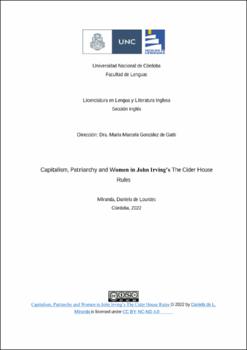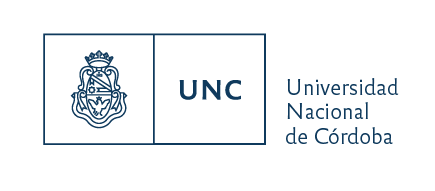| dc.contributor.advisor | González de Gatti, María Marcela | |
| dc.contributor.author | Miranda, Daniela de Lourdes | |
| dc.date.accessioned | 2024-03-20T18:45:57Z | |
| dc.date.available | 2024-03-20T18:45:57Z | |
| dc.date.issued | 2022 | |
| dc.identifier.uri | http://hdl.handle.net/11086/551182 | |
| dc.description.abstract | This study intends to analyse the construction of the female body and women’s oppression
in the capitalist and patriarchal society from the gender perspective and socialist feminist
criticism. In John Irving’s The Cider House Rules (1985), there is a dialectical relationship
between capitalism or profit-based systems and patriarchal social structures when it comes to
the characters’ decision of not keeping children – and producing orphans or abortions – and
the covert rules about the production of capital and family imposed by the twentieth-century
society. The novel portrays the female body and women’s issues – motherhood, prostitution
and abortion – as products or results of power-related structures: either through objectification
or male dominance over women. These structures finally reveal how agency is a gendered and
power-driven practice, governed by male characters who are sanctioned by patriarchal codes. | es |
| dc.language.iso | eng | es |
| dc.rights | Attribution-NonCommercial-NoDerivatives 4.0 International | * |
| dc.rights.uri | http://creativecommons.org/licenses/by-nc-nd/4.0/ | * |
| dc.subject | Neo-Victorian Novel | es |
| dc.subject | Gender Issues | es |
| dc.subject | Socialist Feminism | es |
| dc.subject | Capitalism and Patriarchy | es |
| dc.title | Capitalism, Patriarchy and Women in John Irving’s The Cider House Rules | es |
| dc.type | bachelorThesis | es |
| dc.description.fil | Fil: Miranda, Daniela de Lourdes. Universidad Nacional de Córdoba. Facultad de Lenguas; Argentina. | es |





